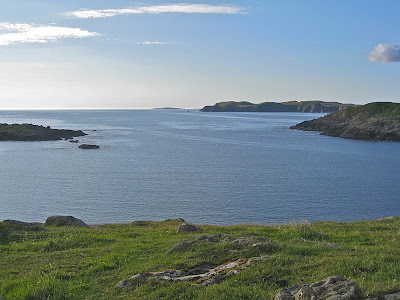 |
| Ben Cruachan summit |
 |
| Loch Etive to the north |
 |
| Ben Cruachan still in cloud from Drochaid Ghlas |
 |
| Looking down to the dam from the ridge between Cruachan and Drochaid Ghlas |
 |
| Ben Cruachan from Stob Diamh |
 |
| Twenty press ups for the last one down |
Monday 26 September 2011
1410m of ascent, 14km, 5hrs 35mins
m Ben Cruachan 1128m 2hrs 40mins
t Drochaid Ghlas 1009m 3hrs 34mins
m Stob Diamh 998m 4hrs 3mins
t Stob Garbh 980m 4hrs 20mins
It was the Glasgow September Holiday Monday and Gregor suggested a walk. There are only a few munros in our current rounds left for either of us south of Fort William. The Cruachan horseshoe had the advantage of being near enough to allow Gregor to get back to Glasgow to play football afterwards. We went via Balloch, Loch Lomond and Loch Fyne, it was dry but rain was threatened and the hills were in the clouds above 600 metres. On the drive to Loch Awe from Inverary, Ben Cruachan loomed into view beneath the wide brim of dark cloud.
We parked by the power station and cut under the railway line by a tunnel at the halt. This was a mistake for we soon lost any path and began a 300-metre ascent through chest-high bracken, brambles and wet grasses. The air was still and sweat soon added to the damp conditions. Eventually, we reached the pylons leading to the dam, climbed a precarious 2-metre high fence and found the private road which allowed us to gather some pace up to the dam. We crossed the dam whilst speculating whether it was low enough to jump into the water on one side or too steep to run down the ribs on the other side. The answers were yes and yes. There is a good track around the west side of the reservoir until the burn from Coire Dearg is reached at the end of the reservoir.
From here a good path ascends by the side of the burn although today it was a bit of a quagmire after recent heavy rains. We climbed to 800 metres where we stopped for a drink and sandwich just before we ascended into the clouds. This is where I had bivouacked 6 years ago with John and Mark so that we could do all 4 munros the next morning and be home by early afternoon. We climbed to the bealach between the top, Meall Cuinail, and Ben Cruachan and then began the long climb up the perched boulders to Ben Cruachan. The wind was not as strong as we had expected but still chilled us as we reached the broken trig point. A flask of coffee was an unusual treat for us. It compensated for the lack of views, we were enclosed by clouds so grey it could have been an art gallery.
I had to take a compass bearing to be sure of our way off the summit and along the splendid ridge that is the highlight of the Cruachan horseshoe. We reached the section where it falls steeply and a party of three were inching their way down the slippery rocks. By the time we reached Drochaid Ghlas, the clouds were beginning to lift and we could see the rest of the ridge leading to Stob Diamh. A couple of walkers were starting the climb to Stob Diamh ahead and they gave us an extra incentive to chase our time of 5hrs 55mins for the same walk of 12 years ago when Gregor was in his early teens and I was not in my early sixties.
At the summit we stopped for a final drink and an orange and then there was just the easy saunter over to the top of Stob Garbh before descending to the Cruachan reservoir. It was very boggy and a great relief to reach the dam, we had passed all the other walkers and were moving at a 'get back in time for football' pace. We dropped down and found the path below the pylons and raced each other down to the railway line. It was steep, wet, slippy and overgrown with prickly and wet vegetation making for a very uncomfortable descent. By a simple twist of fate, he started in front of me, Gregor made it down first and insisted on a photograph of me posing on the rail line for a 'Blood on the Tracks' photo.
























